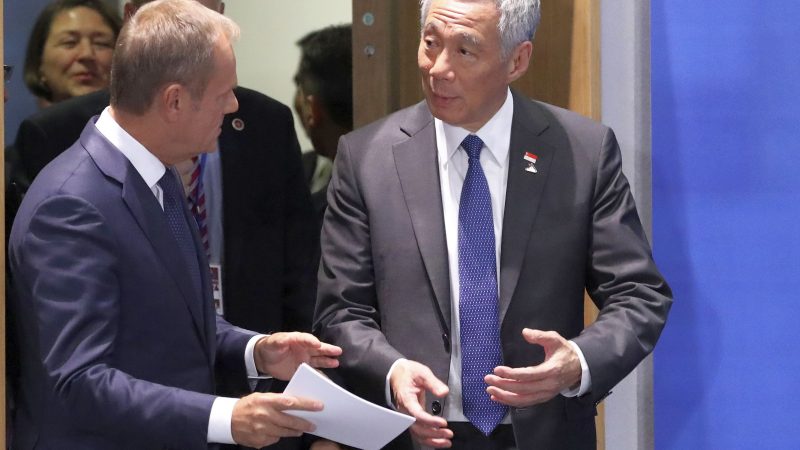
European Union Calls For LGBT Rights In Singapore Through Free Trade Deal
The European Parliament has adopted a resolution on the Partnership and Cooperation Agreement between the European Union (EU) and Singapore, alongside free trade and investment agreements. Highlighted in adopting this agreement the European Parliament called out the need for improving LGBT Rights in Singapore.
Fabio Massimo Costaldo, shadow rapporteur for the resolution and vice-president of the LGBTI Intergroup in the European Parliament noted: “With this resolution, the European Parliament takes position on LGBTI rights in Singapore for the first time. We now count on the other EU institutions to ensure LGBTI rights are fully taken into account in this Partnership and Cooperation Agreement, so we can see positive changes for LGBTI rights in Singapore in the nearest future”.
The European Parliament approved on the EU-Singapore Free Trade Agreement (EUSTFA), the bloc’s first bilateral trade agreement with a southeast Asian country. This resolution means the EU will support democratic and economic development in Singapore, and for the first time highlights Singapore’s LGBT+ rights record. The resolution condemns Singapore’s lack of LGBT+ rights protections and calls for the abolishment of laws penalising same-sex sexual relationships, and for full protection LGBT+ and women’s rights through anti-discrimination legislation.
For all its economic success, first-world healthcare, and a top of the class education system, the Singapore government remains behind in protecting its LGBT community by retaining section 377A, an outdated law that criminalizes sex between men, on its books.
USAID’s LGBT Global Development Partnership found substantial evidence that LGBT people are limited in their freedoms in ways that also create economic hardships. The cost of homophobia on a country’s economy was dissected by the World Bank. “Speaking before a panel of experts and professors in the gender and development fields at the World Bank, Fabrice Houdart, president of World Bank GLOBE, an LGBT resource group for employees at the organization, called discrimination a “significant, self-inflicted economic wound.”
The trade deal removes all existing tariffs on goods from the EU, removes trade barriers by recognizing EU safety tests and will make the business environment more predictable, according to the European Commission.

EU President Donald Tusk and Singapore Prime Minister Lee Hsien at EU Asean Meeting
In its resolution, the European Parliament highlights that the “rights of the Singapore’s LGBTI community are severely restricted”, that consensual sexual relationships between two men are illegal and punished for up to two years in prison and that same-sex relationships are not recognised under law in Singapore.
The resolution goes on to state the EU “Reaffirms the needed commitment and engagement with regard to respect for human rights, including social rights, democracy, fundamental freedoms, good governance and the rule of law, and to working together in this regard; recalls that human rights are at the centre of the EU’s relations with third countries; calls on the Singaporean authorities to ensure, in all circumstances, respect for international law, democracy, human rights and fundamental freedoms, in accordance with the UN Charter and Universal Declaration on Human Rights and considers that the EU should continue providing support to Singapore for social inclusion, respect for human rights and the rule of law, and the promotion of peace, security and judicial reform; welcomes the open public debate on the revision of the unenforced law on the punishment of consensual same-sex relations and calls on the Government of Singapore to fully protect the rights of the LGBTI community; insists that the Government of Singapore abolish the laws penalising sexual relationships between people of the same gender; stresses the need for further cooperation on women’s rights and urges the Government of Singapore to facilitate the adoption of legislation prohibiting all forms of discrimination against women and based on sexual orientation;”
The trade agreement provides new opportunities for Europeans in sectors such as telecommunications, environmental services, engineering, computing and maritime transport. It will also make the business environment more predictable.
Singapore also agreed to remove obstacles to trade besides tariffs in key sectors, for instance by recognising the EU’s safety tests for cars and many electronic appliances or accepting labels that EU companies use for textiles.
There are more than 10,000 European companies in Singapore with total bilateral trade in goods of over €53 billion and €51 billion-worth of trade in services.
The Investment treaties will be replaced by a modern common investment protection framework and the Partnership agreement sets sustainability and trade standards.
“This is yet another win-win trade agreement negotiated by the European Union, an agreement that will create new opportunities for European producers, workers, farmers and consumers, while at the same time promoting cooperation and multilateralism,” Commission President Jean-Claude Juncker said in a press release.
The European Parliament also insists on human rights being at the center of the relations between the EU and third countries. It “calls on the Government of Singapore to fully protect the rights of the LGBTI community”. It also “insists that the Government of Singapore abolish the laws penalising sexual relationships between people of the same gender” .
The resolution also “urges the Government of Singapore to facilitate the adoption of legislation prohibiting all forms of discrimination against women and based on sexual orientation”.
Recently a North American trade deal also included protections for LGBT. The new United States-Mexico-Canada Agreement contains requirements that workers be protected from discrimination on the basis of sex, including sexual orientation and gender identity. Canada recently has said that advancing LGBT Rights is key to its own economic growth. In September India’s Supreme Court struck down Section 377 of the penal code and decriminalized homosexuality while advancing fundamental human rights. Recently Taiwan is the first Asian country to send a marriage equality bill up for a vote. Japan is making slow progress on its LGBT Rights.
The LGBT Foundation is a not-for-profit organization with the mission to create the LGBT Token cryptocurrency and utilize blockchain technology to achieve equal rights and acceptance for all members of the LGBT+ community worldwide.